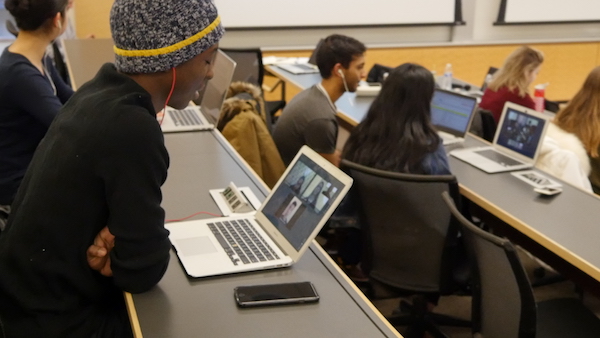
Students gather at U-M’s Ross School of Business for the launch of the M²GATE program.
Brett Ritter admitted to feeling a bit nervous at the kickoff event for WDI’s new M²GATE program where he would meet his international teammates for the first time. He worried that cultural differences and a language barrier might hinder his ability to work with his peers from the Middle East and North Africa.
“There were a lot of unknowns that made me a little worried if this program was right for me,” the freshman finance major at the Ross School of Business said. “But I was given great guidance by our leaders as to what the program was all about. The mentors made me excited to go forward working with my team. I also enjoyed meeting my team for the first time.”
“We learned a lot about each other in such a short period and it really opened my eyes.”
Ritter is one of 53 U-M students participating in the first cohort of the MENA-Michigan Initiative for Global Action Through Entrepreneurship (M²GATE) program. He and his fellow Wolverines are paired with 112 undergrads from top universities in Egypt, Libya, Morocco and Tunisia to find entrepreneurial solutions to social challenges in the Middle East and North Africa (MENA) region. (Applications are being accepted through March 1 for the second and third cohorts for the program, which is open to undergraduates from Eastern Michigan University and Wayne State University along with all three U-M campuses.)
For the first cohort, the 165 total students were placed on 28 teams of five to six students each. Working virtually, teams will develop social entrepreneurship projects and accompanying pitches over an eight-week period. Guiding them along the way are instructors, mentors, and successful entrepreneurs from MENA and Michigan. The teams coordinate times for virtual group work and produce a pitch video as a final assignment.
Claudia Cornejo, a sophomore at Ross studying business administration, couldn’t wait to attend the Jan. 26 program kickoff. She was excited to meet the students she would work with, understand their perspectives on the program and why they are interested in social impact. After meeting her teammates from Morocco, she said she was fascinated by the idea that although they grew up in different worlds, all were aware of social challenges within their own communities and were motivated to join a program that addressed them.
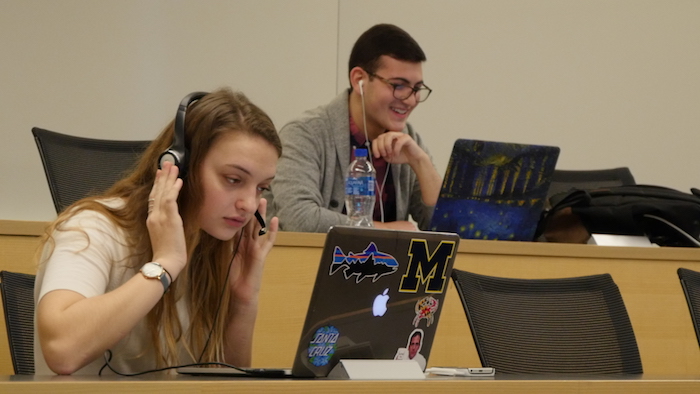
“It was incredible to see just how similar our personalities and perspectives were, even though our upbringings and environments are so distinct,” Cornejo said.
At the program kickoff, participants from the four MENA countries were beamed via video chat into a Ross School of Business classroom where the U-M students were seated. After introductions, the students worked on a team-building exercise before coming back together to report on what they learned. Program organizers then walked the teams through the eight-week schedule and where to go for resources.
Cornejo said she is interested in education policy in the U.S. and around the world, and believes entrepreneurship could be an untraditional approach to help solve challenges.
“This program took my interests to the next level by allowing me to work one-on-one with people from different parts of the world,” she said. “I have come across many different programs and organizations that do work internationally but never give you this unique personal relationship with fellow students around the world. M²GATE provides the perfect platform that connects me to students with the same passions and goals as me, but with different perspectives, worldviews and approaches to try and achieve these goals.”
Ritter said he is currently working on a social entrepreneurship project independently and thought M²GATE would help him learn more. He also wanted to connect with people from other cultures.
“This is a once-in-a-lifetime experience where we could have mentors help us help the world,” Ritter said. “What I found appealing about the project was that it teaches team building and valuable communication skills that are essential for any aspiring businessman.”
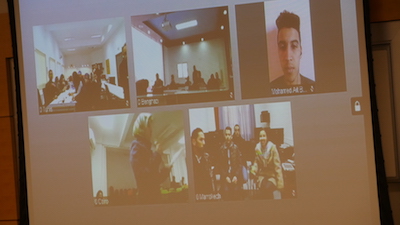 Adrian Maloy, a second-year student majoring in accounting and finance at UM-Dearborn, was teamed with some students in Tunisia. He said the M²GATE program was appealing because it exposes him to a different culture.
Adrian Maloy, a second-year student majoring in accounting and finance at UM-Dearborn, was teamed with some students in Tunisia. He said the M²GATE program was appealing because it exposes him to a different culture.
“Our world is becoming smaller, and taking the opportunity to gain global competencies will become a companion in how people develop socially,” Maloy said. “I feel this program allows you to gain those competencies.”
Cornejo and Ritter also see the program as a possible stepping stone to studying abroad and maybe a career overseas.
“I have always seen my career path taking me abroad, however this will be my first experience communicating across different cultures to try and ameliorate a social issue affecting many people around the world,” Cornejo said. “I want to learn how other cultures approach issues such as education reform, and how we can translate and combine our ideas to create an even better solution than just one community or culture could come up with.
“I am a firm believer that analyzing different perspectives and cultures can lead you to a more comprehensive solution to any problem.”
Ritter said he hopes the program gives him some guidance on “what my purpose is on helping society.”
“We all need to do our part, and I hope this program can make me realize what that part is,” he said, adding that it might be spending a semester or more studying overseas.
“Studying abroad is one of the greatest experiences I can get,” he said. “It’s college. I want to live it to the fullest, however I can.”
Applications for M2GATE are being accepted through March 1 here.
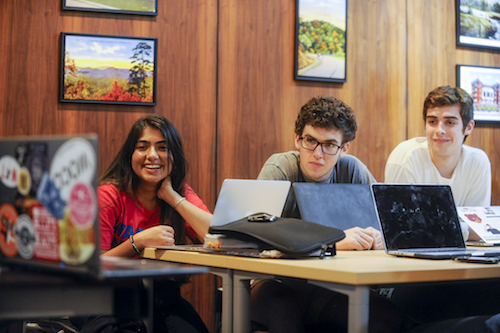
Students at Wofford College conduct a virtual exchange discussion in a program to increase cross-cultural understanding funded by the Stevens Initiative in 2016. (Image credit: Mark Olenckim/Stevens Wofford College.)
As the first cohort of Michigan students begin collaborating online with their peers in four North African countries, WDI is seeking interested undergraduate students at Eastern Michigan University, all three campuses of the University of Michigan and Wayne State University to join the next two groups of participants for this unique international opportunity.
The program, the MENA-Michigan Initiative for Global Action Through Entrepreneurship (M2GATE), pairs undergrads from the three Michigan universities with those in Egypt, Libya, Morocco and Tunisia to find entrepreneurial solutions to social challenges in the Middle East and North Africa (MENA) region. It also increases cross-cultural understanding and equips young people with the skills needed to thrive in a 21st century economy.
Working virtually, teams will develop social entrepreneurship projects and accompanying pitches over an eight-week period with the help of instructors, mentors, and successful entrepreneurs from MENA and Michigan. Each cohort of approximately 128 international students and 64 Michigan-based students will culminate in a virtual competition.
The teams comprised of students from Michigan universities and students from Egypt, Libya, Morocco and Tunisia will coordinate times for virtual group work and produce a pitch video as a final assignment. In all, students will spend about 32 hours on the program. The second cohort is scheduled to run from early April to early June; the third cohort will be from early May to mid-July.
Judges will look for scalable solutions that feature science, technology, engineering, and math – or STEM-based – innovations. The MENA students from the winning teams will have the chance to travel to Michigan to interact with entrepreneurs in Ann Arbor and Detroit, and, as a team, pitch their projects to an expert panel for feedback and further development.
The partner organizations in M²GATE include Benghazi Youth for Technology & Entrepreneurship (BYTE) in Libya, Al Akhawayn University in Morocco, and Tunis Business School at the University of Tunis in Tunisia.
Michigan college students selected for the program will attend an orientation meeting as well as debrief and wrap-up sessions at the end of the eight weeks. They will be invited to watch lectures and interactive discussions on WDI’s ExtendEd learning portal on six topics: cross-cultural team building; communication skills; leadership development; design thinking and creative inquiry; introduction to entrepreneurship; and, creating a business model canvas.
WDI was one of 13 organizations chosen for the second round of the 18-month program, which is funded by the Stevens Initiative, an international effort to build career and global competence skills for young people in the U.S. and MENA region. The Initiative honors the legacy of U.S. Ambassador Chris Stevens, who devoted his life to building bridges between people from different cultures.
“After the Arab Spring in 2010, young people in this region increasingly turned to social entrepreneurship to address the challenges in their societies,” said Amy Gillett, vice president of WDI’s Education Initiative. “Given the state of these economies and the upsurge of entrepreneurial interest, this program comes at an ideal time.”
The co-curricular program will equip students with skills in entrepreneurship, team building, innovation and design thinking, international business, problem solving and critical thinking.
“This is a wonderful opportunity for students to work cross-culturally, forge new international connections, and gain exactly the type of 21st century skills needed to succeed in today’s global economy,” Gillett said.
Interested undergraduate students from EMU, U-M and WSU can learn more about M²GATE at the program website. They may also attend an upcoming screening of the film “Extreme by Design,” at 4-6 p.m. Feb. 1 in Room R0210 at the Ross School of Business. WDI is co-hosting a screening of the documentary, which features college students introducing innovative products in emerging markets by applying design thinking and entrepreneurship principles. The showing will followed by a panel discussion and a reception. Space is limited, so students are encouraged to register here.
Housed at the Aspen Institute, the Stevens Initiative is a collaboration between the family of Ambassador J. Christopher Stevens, the U.S. Department of State, the Bezos Family Foundation, the governments of the United Arab Emirates and Morocco, and Microsoft, Twitter, Vidyo, and LRNG.
For more details and to apply to M²GATE, click here.
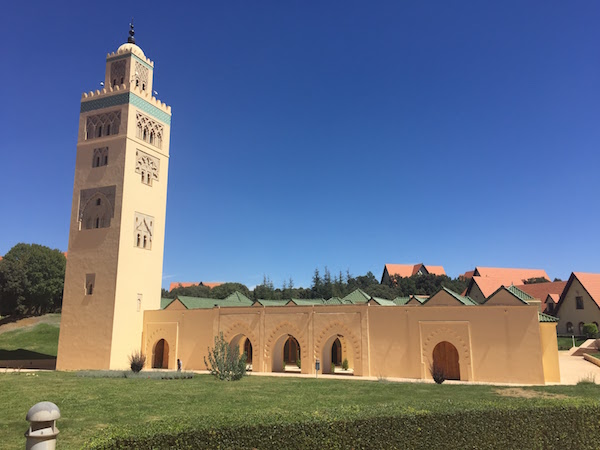
Al Akhawayn University in Morocco, one of the organizations participating in the M2GATE project. (Image by Meghan Neuhaus/WDI)
WDI has been selected by the Stevens Initiative to run an exciting program that uses online, collaborative learning to connect University of Michigan undergraduate students with their peers in four North African nations to find entrepreneurial solutions to social challenges in the region, while also increasing cross-cultural understanding and equipping young people with the skills needed to thrive in a 21st century economy.
Through a virtual exchange, U-M students at the Ann Arbor, Flint and Dearborn campuses will be teamed with fellow students in Egypt, Libya, Morocco, and Tunisia. Together, the teams will develop and launch social entrepreneurship projects with the help of instructors, mentors, and successful entrepreneurs from Michigan and the Middle East and North Africa (MENA) region.
WDI was one of 13 organizations chosen for the second cohort of the 18-month program, which is funded by the Stevens Initiative, an international effort to build career and global competence skills for young people in the U.S. and MENA region by growing and enhancing the field of virtual exchange. The Initiative honors the legacy of U.S. Ambassador Chris Stevens, who devoted his life to building bridges between people from different cultures.
The program, the MENA-Michigan Initiative for Global Action Through Entrepreneurship (M2GATE), will support three, eight-week cohorts, with the first beginning in January. Each cohort of 128 MENA students and 64 U-M students will culminate in a virtual competition. Judges will look for scalable solutions that feature science, technology, engineering, and math – or STEM-based – innovations. The MENA students from the winning teams will have the chance to travel to Michigan to interact with entrepreneurs in Ann Arbor and Detroit, and as a team pitch their projects to an expert panel for feedback and further development.
U-M students selected for the program will attend an orientation meeting as well as debrief and wrap-up sessions at the end of the eight weeks. They will be invited to watch lectures and interactive discussions on WDI’s ExtendEd learning portal on six topics: cross-cultural team building; communication skills; leadership development; introduction to entrepreneurship; design thinking and creative inquiry; and, creating a business model canvas.
The teams comprised of students from U-M and students from Egypt, Libya, Morocco, and Tunisia will coordinate times for virtual group work and produce a pitch video as a final assignment. In all, students will spend about 32 hours on the program over the eight-week time period.
The new programs at U-M and the other grantee organizations will expand the Initiative’s reach to 30,000 students in 18 countries in the Middle East and North Africa and 31 U.S. states. Examples of other programs in the second cohort include one that uses virtual exchange to improve global citizenship and problem-solving skills among hospitality students in the U.S. and Jordan, and an engineering program addressing common environmental and public policy challenges through collaboration between students in Arizona and the Palestinian Territories. The other Stevens Initiative grantees announced today are:
“With the support of the Stevens Initiative, young people from the United States, the Middle East, and North Africa are connecting and learning together – gaining important skills while learning about global cultures,” said Elliot Gerson, executive vice president of Policy and Public Programs of the Aspen Institute. “We look forward to working with the William Davidson Institute at the University of Michigan to scale the Initiative to Ann Arbor and Dearborn.”
“After the Arab Spring in 2010, young people in this region increasingly turned to social entrepreneurship to address the challenges in their societies,” said Amy Gillett, vice president of WDI’s Education Initiative. “Given the state of these economies and the upsurge of entrepreneurial interest, this program comes at an ideal time.”
The unique co-curricular program will equip students with skills in entrepreneurship, team building, innovation and design thinking, cross-cultural communication, international business, problem solving, and critical thinking.
“This is a wonderful opportunity for students to work cross-culturally, forge new international connections, and gain exactly the type of 21st century skills needed to succeed in today’s global economy,” said Gillett.
Housed at the Aspen Institute, The Stevens Initiative is a collaboration between the family of Ambassador J. Christopher Stevens, the U.S. Department of State, the Bezos Family Foundation, the governments of the United Arab Emirates and Morocco, and Microsoft, Twitter, Vidyo, and LRNG.
For more details and to apply, click here.


The William Davidson Institute at the University of Michigan is running an exciting new program that pairs University of Michigan undergraduate students with their peers in four North African nations to find entrepreneurial solutions to social challenges in the region.
Through the virtual exchange, U-M students at the Ann Arbor and Dearborn campuses will be teamed with fellow students in Egypt, Libya, Morocco, and Tunisia. Together, the teams will develop and launch social entrepreneurship projects with the help of instructors, mentors, and successful entrepreneurs from Michigan and the Middle East and North Africa (MENA) region.
“After the Arab Spring in 2010, young people in this region increasingly turned to social entrepreneurship to address the challenges in their societies. Given the state of these economies and the upsurge of entrepreneurial interest, this program comes at an ideal time,” said Amy Gillett, vice president of WDI’s Education Initiative.
The unique co-curricular program will equip students with skills in entrepreneurship, team building, innovation and design thinking, cross-cultural communication, international business, problem solving, and critical thinking.
“This is a wonderful opportunity for students to work cross-culturally, forge new international connections, and gain exactly the type of 21st century skills needed to succeed in today’s global economy,” said Gillett.
The program, the MENA-Michigan Initiative for Global Action Through Entrepreneurship (M2GATE), will support three, eight-week cohorts, with the first beginning in January 2018. Each cohort of 128 MENA students and 64 U-M students will culminate in a virtual competition. Judges will look for scalable solutions that feature science, technology, engineering, and math – or STEM-based – innovations. The winners will have the chance to travel to Michigan to interact with entrepreneurs in Ann Arbor and Detroit, and pitch their projects to an expert panel for feedback and further development.
An informational session will be held on the Dearborn campus at 3 p.m. on Nov. 13 at the Talent Gateway Commons, Suite 285 Fairlane Center North (FNC).
U-M students selected for the program will attend an orientation meeting as well as a debrief and wrap-up session at the end of the eight weeks. They will be invited to watch lectures and participate in interactive discussions on WDI’s ExtendEd Learning Portal on six topics. They are: cross-cultural team building; communication skills; leadership development; introduction to entrepreneurship; design thinking and creative inquiry; and, creating a business model canvas.
The teams comprised of students from U-M and partner institutions in Egypt, Libya, Morocco, and Tunisia will coordinate times for virtual group work and produce a pitch video as a final assignment. In all, students can expect to spend about 32 hours on the program over the eight-week time period.